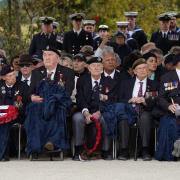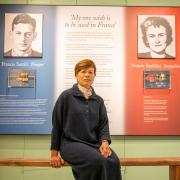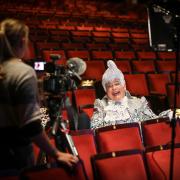Having just returned from his round-the-world cycle, James Ketchell talks to Claire Pitcher about how it feels to complete the ‘ultimate triathlon’

“It doesn’t matter what you’re trying to achieve, if you just keep tapping away and you don’t stop when you’re feeling like you can’t be bothered, if you just hang on and keep making an effort I can 100 per cent guarantee that what you’re trying to achieve will come.” I quoted these inspirational words last time I spoke to Basingstoke adventurer, James Ketchell. Regular readers will remember the interview in 2011 when he had recently arrived back from climbing Everest. Before that he had rowed solo across the Atlantic.

Three years ago he was already planning to cycle around the world and in January this year he pedalled through the finish line at Greenwich Royal Observatory – after an 18,000-mile trip across the globe which had begun on 30th June 2013.

Before undertaking the last stage of his ‘ultimate triathlon’, James sensibly decided to do a practice cycle across America. He did have support however, during those 22 days, which was something he wasn’t going to have on his journey around the world.

His American cycle taught him many valuable lessons, including that “you can’t plan too much in advance because things change. The roads may not be as good as you thought they were. I had to take a 300-mile diversion in Thailand because a protest kicked off and they were blockading a road I needed – so I had to go around. You need to be able to adapt and improvise on the go.”

Starting on the Prime Meridian Line at the Royal Observatory, James cycled through Europe to Istanbul before boarding a plane to Delhi. He spent a month in India, visiting schools as he made his way to Sri Lanka. Here, he flew to Bangkok and cycled through Thailand, Malaysia and Singapore. Next he checked in on a flight to Perth before setting off across Australia and then revisiting the USA.

Road rage, dense traffic, toothache, you name it, James came up against it during his six-month cycle – but which was the hardest country to navigate?
“I would have to say India. It’s chaos, but organised chaos in a weird way. I got hit by a Tuk Tuk and the driver didn’t stop. I was fine, but my bike wasn’t and it was 200 miles to the nearest bike shop.”
However, a close shave with a Tuk Tuk sounds quite tame compared to James’s most dangerous moment on his journey.
“The scariest moment I had was when I was camping one night in India. It was quite remote, I thought I’d chosen a safe spot, the next thing I know two guards appeared out of nowhere, it was midnight and pitch black.
“How they knew I was there and where they came from I had no idea. I could see their torches and I realised they were coming towards me. They started shouting at me so I decided to pack up as quickly as I could and get out of there. They started screaming and shouting at the top of their voices. What really worried me was that they started shouting for other people. My mind started playing tricks on me; I thought all the worst things. I was powerless because I couldn’t communicate with them. I left all my kit, jumped on my bike and pedalled as fast as possible. Luckily they didn’t give chase.”
Anyone who hears of this or any of his tales of close shaves always ask him why he does it, how he carries on and what compels him to continue putting himself in harm’s way.
“I enjoy doing what might be other people’s nightmares. I like being able to come back and share everything that I do. I want to inspire people - not necessarily to become adventurers - but to reach their own personal goals.”
Like with the row and the climb, it’s coping mentally that’s the hardest part.
“The cycle was mentally the most difficult thing I’ve ever done. The rowing wasn’t mentally that hard, because I enjoyed all 110 days. It took me 213 days to cycle round the world. That was harder because it was relentless, every day I was cycling. I fell behind schedule on occasion, which played on my mind.
“When you get off the bike there is nowhere to hide – you’re not moving anywhere. If you’re in a boat at least you’re still moving (current depending). The trick to keeping motivated is to live fast when you’re on a bike. Eat quick, sleep quick, organise quick and you can get back on the bike and keep moving forward. At least, that’s what works for me.”
James met some amazing people along his journey; from school children to heroic dentists and wonderful families and individuals who opened their homes to him when he needed to rest his weary legs.
He tasted some delicious cuisines and gazed upon some awe-inspiring scenery; but it was arriving back on home soil that was his most memorable moment.
“Seeing all of those people was incredible. The feeling was magical. I struggled a lot on the cycle. When I reached America I hit a massive wall psychologically. I tried not to think about it and I just kept the pedals turning - I had to. At those tough times I just thought of those people who supported me, the Scouts, my friends and family.”
James is now the only person in the world to have completed the solo Atlantic row, Everest climb and cycle round the world. Surely, then, that’s an end to it?
When we last spoke he talked of settling down and having a ‘normal’ life, but the media attention and talk of what’s next soon put those thoughts out of his mind.
“I’m a true believer that people come in to your life for a reason. Ash Wilson came into mine through my work as a Hampshire Scouting Ambassador.
Ash has been a scout member for 7 years and works as Deputy Director of Communications for the movement. He wanted his own adventure, but he’s epileptic so can’t do things on his own. He can’t ride a bike or climb, but if he was with someone he could row. He asked me if I’d row an ocean with him – so we’ve chosen the Indian Ocean.”
Ash’s epilepsy poses a new set of challenges; James is planning to go on a course that will help him to understand and treat epilepsy. “We’re trying to prove that having a disability should never stop you from achieving what you want.” The date for the mens’ challenge is April 2015. They will row 4,000 miles together, from Western Australia across the Ocean to Mauritius.
“It will be tougher than the Atlantic,” explains James, “because it’s further and the winds and the currents are more unpredictable.”
Still, that doesn’t seem to faze him. “Going around the world, expeditions in general, you do need to have an element of physical strength, but not as much as you might think. It’s mental strength you need. This was my third big expedition and you get stronger over time; you mature with all the experiences and your comfort zone begins to grow.”
James spends a lot of his time while he’s back in the UK talking to companies, schools and Scout groups about his adventures and following his ultimate triathlon, he’s planning a trip into unchartered territory - writing.
“I’m taking time out to write a book. From when I had my motorcycle accident in 2007, to not walking very well, getting better, preparing for and rowing the Atlantic, how the transition from the row to Everest came about, the climb itself, illness when I got back and to the present day, my return from the cycle. All with plenty of photos and untold stories.”



























